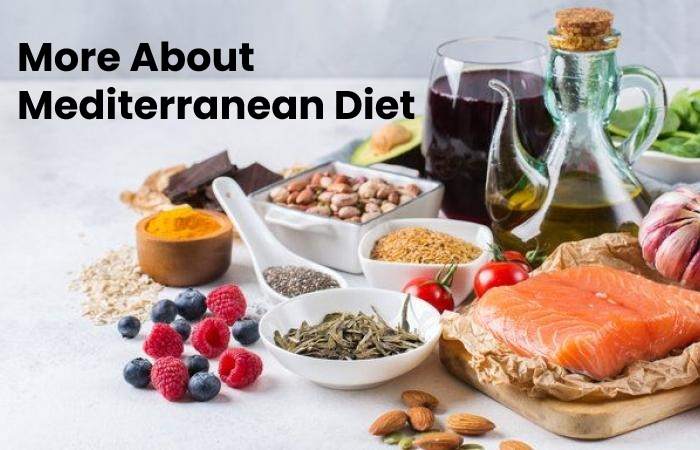Mediterranean Diet – Cradle of Western civilization, the Mediterranean basin also has one of the richest culinary traditions in the world due to the combined influence of European, African, and Middle Eastern cultures. Although there is no single Mediterranean diet, as each country in this region has its unique culinary practices, traditional Mediterranean cuisine nonetheless has certain common traits, notably the principal place occupied by original foods.
Vegetable (fruits, vegetables, legumes, nuts, seeds, grain products, olive oil, red wine). The friendliness of the meals and the pleasure of cooking and eating the food are also essential elements of the Mediterranean diet and ensure that meals are privileged moments of sociability and participate in the community’s cohesion. More than a simple way of eating, the Mediterranean diet is a natural way of life, now recognized by UNESCO as part of the intangible cultural heritage of humanity.
More About Mediterranean Diet
The Mediterranean Diet is the outmoded diet of people living in countries bordering the Mediterranean Sea, such as Spain, Italy, Greece, and Tunisia. Described in the 1950s by the American scientist Ancel Keys, this way of eating incorporates simplicity and moderation.
Essentially composed of plant-based dishes and unprocessed foods, the Mediterranean Diet contains little added sugar, bad saturated or transfats, or salt and provides a great many nutrients: dietary fiber, antioxidants, minerals, and good mono and polyunsaturated fats.
The United Nations Educational, Logical and Cultural Organization (UNESCO) recognized the importance and unique character of the Mediterranean Diet by inscribing it in 2013 on the Representative List of the Intangible Cultural Heritage of Humanity, alongside Chinese calligraphy, the Argentinian tango, and Japanese Kabuki theatre.
What does this diet consist of?
It is a diet practiced in Cyprus, Croatia, Spain, Greece, Italy, Morocco, and Portugal. As each country’s food has its particularities, the researchers looked at their common points. That is how the model was formed, based on quantities of food categories rather than specific foods.
This diet adapts perfectly to our reality and local foods. We don’t have to live in the Mediterranean basin to eat there! Instead of biting into a fig, we’re biting into an apple here. The goal is not to eat the same thing but rather to place the same importance on broad categories of foods.
And what’s around the plate is just as important as what’s on it. So, for example, among the Mediterranean people, we do not eat alone. On the contrary, the meal represents an ideal occasion to get together, and the notion of pleasure is central to it. This way of approaching food is so healthy that UNESCO inscribed it on the intangible cultural heritage of humanity in 2013.
What about science in all of this?
Even though it is an ancestral food model, the Mediterranean diet offers benefits in our contemporary context. Even in countries that are not fortunate enough to border the famous sea.
Diabetes, cancer, cardiovascular disease, and obesity are the leading causes of death in industrialized countries. In addition, the aging population suffers from neurodegenerative diseases, such as Alzheimer’s. All of these ailments can be related to diet. It is why they are of such interest to nutrition researchers. They want to find a way to eat that reduces the risk of developing these diseases. And sometimes, you don’t have to dig very far to find the solution.
Highlighted in the 1950s by the American scientist Ancel Keys 1. The Mediterranean diet (or Cretan diet) recognized for its beneficial effects on health. For example, it protects against cardiovascular disease and type 2 diabetes and limits developing cancer. Since 2013, it has even been listed as an Intangible Cultural Heritage of Humanity by UNESCO under the “Mediterranean diet.” So what are the secrets of this healthy diet that combines food with a moment of social exchange? And above all, how can it inspire us daily?
The main principles of the Mediterranean diet
The Mediterranean diet is, above all, a way of life that allows you to stay healthy. It combines a varied and balanced diet with a particular life form (exercising, cooking, sharing the pleasures of meals, etc.). Therefore, it is a good source of inspiration for healthy eating daily without being too restrictive.
In the Mediterranean diet, the emphasis is on:
- Whole grain products
- Unlimited fruits and vegetables
- Olive and rapeseed oil as primary fats
- Legumes and oilseeds
- Quality animal proteins (fish, seafood, poultry, eggs, a little red meat, etc.)
- Goat’s and sheep’s milk products
- Red wine as an accompaniment (1 glass maximum per meal) and water at will.


